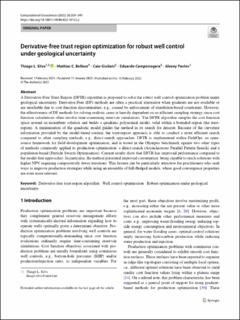Derivative-free trust region optimization for robust well control under geological uncertainty
Peer reviewed, Journal article
Published version

Åpne
Permanent lenke
https://hdl.handle.net/11250/3022784Utgivelsesdato
2022Metadata
Vis full innførselSamlinger
Sammendrag
A Derivative-Free Trust-Region (DFTR) algorithm is proposed to solve the robust well control optimization problem under geological uncertainty. Derivative-Free (DF) methods are often a practical alternative when gradients are not available or are unreliable due to cost function discontinuities, e.g., caused by enforcement of simulation-based constraints. However, the effectiveness of DF methods for solving realistic cases is heavily dependent on an efficient sampling strategy since cost function calculations often involve time-consuming reservoir simulations. The DFTR algorithm samples the cost function space around an incumbent solution and builds a quadratic polynomial model, valid within a bounded region (the trust-region). A minimization of the quadratic model guides the method in its search for descent. Because of the curvature information provided by the model-based routine, the trust-region approach is able to conduct a more efficient search compared to other sampling methods, e.g., direct-search approaches. DFTR is implemented within FieldOpt, an open-source framework for field development optimization, and is tested in the Olympus benchmark against two other types of methods commonly applied to production optimization: a direct-search (Asynchronous Parallel Pattern Search) and a population-based (Particle Swarm Optimization). Current results show that DFTR has improved performance compared to the model-free approaches. In particular, the method presented improved convergence, being capable to reach solutions with higher NPV requiring comparatively fewer iterations. This feature can be particularly attractive for practitioners who seek ways to improve production strategies while using an ensemble of full-fledged models, where good convergence properties are even more relevant.
